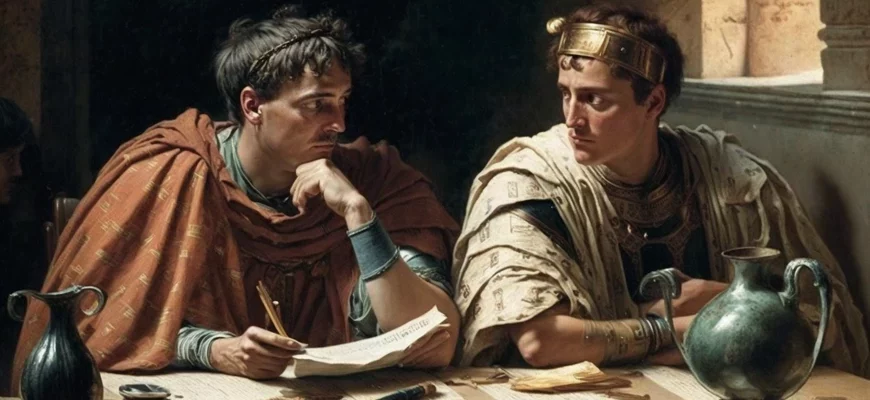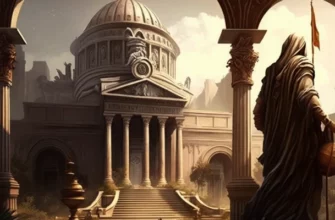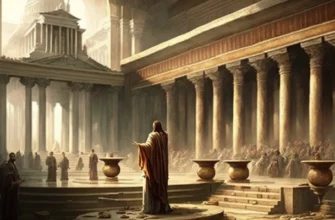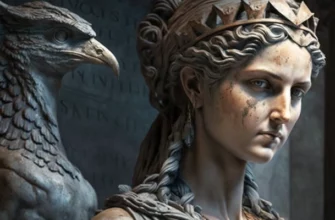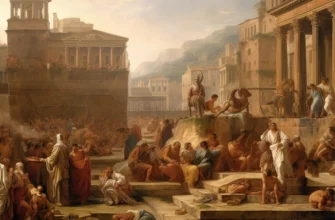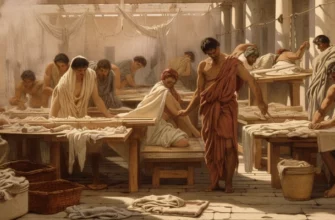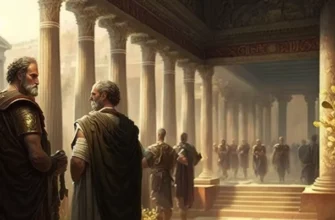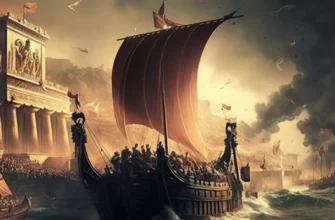The reforms of the Gracchus brothers, Tiberius and Gaius, played an important role in the development of Ancient Rome. Tiberius proposed reforms aimed at improving the living conditions of ordinary Romans, such as reducing the land holdings of the patricians, providing land to the poor, and helping the homeless. His brother Gaius was also known for his reforms, in particular, he proposed new laws on land ownership and the distribution of state lands, which he tried to implement.
The reforms of the Gracchi brothers were aimed at reducing social inequality and improving the lives of ordinary Romans. Although these reforms met with considerable resistance from the patricians and most wealthy Romans, they played an important role in the further development of the Roman Empire and became a model of political progress for future generations.
- Tiberius Gracchus and his reforms
- The political career of Tiberius Gracchus
- Reforms introduced by Tiberius Gracchus
- Results of Tiberius Gracchus’ reforms
- Gaius Gracchus and his reforms
- The political career of Gaius Gracchus
- Reforms introduced by Gaius Gracchus
- The results of Gaius Gracchus’ reforms
- Overall assessment of the Gracchi brothers’ reforms
- Features of the political activities of the Gracchi brothers
- The role of the Gracchi brothers’ reforms in the further history of Rome
- Conclusion
Tiberius Gracchus and his reforms
Tiberius Gracchus was an ancient Roman politician who proposed reforms aimed at improving the lives of ordinary Romans. He sought to limit the vast land holdings of the patricians and allocate land to the poor, as well as provide assistance to the homeless and others. Tiberius’ reforms also included reducing the power of the Senate and increasing the power of the tribunes of the people.
However, Tiberius Gracchus’ reforms were met with resistance from the patricians and other wealthy Romans, which led to his violent death. Despite this, his reforms played an important role in shaping the future of Roman law and the political system, and they became a model for the further development of Ancient Rome.
The political career of Tiberius Gracchus
Tiberius Gracchus was a famous politician of Ancient Rome who held the office of tribune of the people twice, in 133 and 123 BC. He was also elected to the office of quaestor and later became a praetor. However, his most important position was that of tribune of the people, where he was able to carry out his reforms and fight against the patricians.
After his first term as tribune of the people, Tiberius Gracchus became famous for his reforms, in particular, he tried to reinstate the ban on the sale of state lands and introduce a law limiting land ownership. After his second term as tribune, he also attempted to reduce the influence of the Senate and give more power to the tribunes. However, these reforms met with significant resistance from the patricians, which led to his violent death.
Reforms introduced by Tiberius Gracchus
Tiberius Gracchus was known for his reforms aimed at improving the lives of ordinary Romans and reducing the influence of the patricians. Among the most important reforms introduced by Tiberius Gracchus are the following:
Law limiting land ownership. The law limited the amount of land that one man could own in order to distribute land to poor Romans.
The law on granting land to the homeless. The law provided for the granting of land to the homeless and a reduction in their tax burden.
The law on restricting the sale of state lands. The law provided for the restoration of the ban on the sale of state lands to prevent their concentration in the hands of a few patricians.
The law on granting citizenship to foreigners. The law provided for the granting of Roman citizenship to foreigners who had rendered special services to the state.
The law on reducing the influence of the Senate. The law provided for the restriction of the power of the Senate and the increase of the power of the tribunes of the people.
These reforms had a significant impact on the development of Ancient Rome and became a model for further political development.
Results of Tiberius Gracchus’ reforms
The reforms introduced by Tiberius Gracchus had a significant impact on the development of Ancient Rome. As a result of the reforms:
Political reforms increased the influence of the people on state affairs and reduced the influence of the patricians.
Social reforms allowed poor Romans to gain access to land and improved their living conditions.
Economic reforms helped reduce unemployment and increase production.
The reform granting citizenship to foreigners contributed to the development of cultural and economic exchange with other peoples.
Overall, Tiberius Gracchus’ reforms helped change the political, social, and economic landscape of the Roman Empire and increased its influence on world history.
Gaius Gracchus and his reforms
Unlike his brother, Gaius Gracchus had less influence on the politics of ancient Rome.
However, his reforms also had a certain impact on the social and economic spheres of the Roman Empire. His reforms included:
Land reform, which limited the maximum amount of land that could be owned.
Reform to reduce taxes for poor Romans and increase their representation in the courts.
Reform of the army, which allowed poor Romans to enlist.
Reform of citizenship, which simplified the procedure for granting citizenship to foreigners.
Although Gaius Gracchus’ reforms were not as significant as those of his brother Tiberius, they still helped to improve the social and economic situation in the Roman Empire.
The political career of Gaius Gracchus
Gaius Gracchus was a Roman politician and reformer in the second half of the 2nd century BC. He was a member of a patrician family and came to power thanks to his abilities and intellectual gifts.
In 133 BC, Gaius Gracchus was elected tribune of the people, which gave him considerable influence over the legislation of the Roman Republic. He proposed a number of reforms, including land reform, a law granting Roman citizenship to foreigners, and reform of the judicial system.
His land reform provided for the redistribution of land among the poor and prohibited large landowners from holding land that they could not cultivate. The law granting Roman citizenship to foreigners made the Roman state apparatus more universal and reduced discrimination against non-Romans.
The reform of the judicial system provided for the creation of special courts to ensure greater fairness in court proceedings. However, these reforms were met with significant resistance from those in society who did not want to lose their positions.
Despite the resistance, Gaius Gracchus continued to promote his reforms, which brought him into conflict with many influential patricians. In 121 BC, Gaius Gracchus was walled up in a temple with his supporter, who later burned to death along with the building. His death marked the end of his reformist career, but his ideas continued to influence events in the Roman
Republic and even the following centuries.
Gaius Gracchus became an important symbol of the Roman Republic, which is believed to have undergone radical changes during this period. His ideas about equality before the law, redistribution of wealth, and protection of minority rights became the basis for many similar reforms in the future.
Although Gaius Gracchus did not manage to implement all of his reforms, his influence on Roman politics and culture was significant. He became one of the most famous historical figures of Rome, and his name has been preserved in history as a symbol of the Roman reformer.
Later, during the Roman Empire, Gaius Gracchus’ ideas about human rights and freedoms were embodied in legislative acts, including the laws of Justinian in the 6th century AD. Gaius Gracchus’ influence on the politics and ideas of Roman culture was so great that his name has remained in history as a symbol of a reformer whose work was inextricably linked to the history of the Roman Republic.
Reforms introduced by Gaius Gracchus
As tribune of the people, Gaius Gracchus introduced several reforms aimed at improving the lives of Romans, including:
The Land Reform Act. This law provided for the redistribution of land among poor farmers and a reduction in the land holdings of wealthy Romans. The idea was that poor farmers who did not have enough land could grow enough food for their families and sell it at the market.
The Law on the Expansion of Citizenship. The law allowed some foreigners to obtain Roman citizenship. This reform was aimed at increasing the number of Roman citizens and expanding Rome’s influence in the region.
Law on tax reduction. Gaius Gracchus introduced a law that reduced taxes on the increased income of poor Romans. This reform helped reduce the financial pressure on the poor and provided them with more money to live on.
Law on the restoration of the rights of the tribunes of the people. Gaius Gracchus restored the rights of the tribunes of the people, which had been restricted in the previous era. This reform allowed the tribunes of the people to defend the rights of poor Romans and reduce the influence of rich and powerful Romans on the politics of the Roman Republic.
Law on the creation of public grain warehouses. Gaius Gracchus introduced a law that allowed the creation of public grain warehouses to store grain and maintain grain prices during times of famine. This reform improved the lives of poor Romans and helped them avoid starvation during difficult times.
The law on the creation of a court of people’s judges. This reform provided for the creation of a court in which people’s judges, instead of a gathering of magistrates, exercised judicial power. This ensured greater fairness in court proceedings and reduced the influence of wealthy Romans on the judicial system.
The law on the restoration of forgotten Roman law. This reform provided for the restoration of a law that had been forgotten during previous reforms, which guaranteed the right to legal protection for immigrants and workers.
The reforms introduced by Gaius Gracchus were aimed at ensuring greater justice in Roman society, reducing inequality between the rich and poor, ensuring greater protection of minority rights, and increasing the influence of the people on the politics of the Roman Republic. However, these reforms met with significant resistance among the rich and powerful Romans, leading to conflict and, ultimately, the death of Gaius Gracchus.
The results of Gaius Gracchus’ reforms
The results of the reforms introduced by Gaius Gracchus were multifaceted. Here are some of them:
Ensuring the rights of minorities: Gaius Gracchus’ reforms ensured greater protection of the rights of foreigners, their involvement in the political life of the Roman Republic, and provided greater opportunities for the development of immigrants and workers.
Expansion of political rights: Gaius Gracchus’ reforms expanded the rights of the people of the Roman Republic, giving them greater influence over decision-making in the state.
Political stability: Gaius Gracchus’ reforms reduced tensions between different social groups in Roman society, which ensured greater stability in political life.
Increased economic stability: The laws introduced by Gaius Gracchus ensured greater stability in the economic sphere and reduced the risk of famine in difficult times.
However, Gaius Gracchus’ reforms also caused significant social conflicts and political changes in the Roman Republic, which continued for many centuries after his death.
Overall assessment of the Gracchi brothers’ reforms
The assessment of the Gracchi brothers’ reforms is a subject of debate among historians and political scientists. Some researchers believe that the reforms of Gaius and Tiberius Gracchus were significant and had a positive impact on the development of the Roman Republic.
The reforms of the Gracchi brothers ensured greater stability and equality in Roman society, reduced tensions between social groups, and provided greater protection for the rights of minorities. The Gracchi brothers also contributed to the development of infrastructure and reduced the risk of famine in difficult times.
However, there is another point of view that the reforms of the Gracchi brothers did not solve many problems in the Roman Republic, but on the contrary, caused social and political conflicts. For example, the reform of land ownership led to conflict between poor farmers and wealthy landowners.
Thus, although the reforms of Gaius and Tiberius Gracchus had a positive impact on the development of the Roman Republic, their overall assessment is complex and multifaceted, as they caused significant social and political changes in the state.
Features of the political activities of the Gracchi brothers
The political activities of the Gracchi brothers were characterized by a high degree of energy and ambition. They made great efforts to implement their reforms, which contributed to increasing the role of the people in the governance of the state.
One of the main features of the political activities of the Gracchi brothers was their desire to change the status quo and ensure greater equality between social groups. They made efforts to ensure equality before the law, reduce social inequalities, and introduce social programs for the poor.
The Gracchi brothers also advocated for a greater role for the people in the governance of the state and fought against corruption in politics. They opened sessions of the popular assembly to discuss laws and constitutional changes, where ordinary people had the opportunity to express their views.
Another important feature of the Gracchi brothers’ political activity was their desire for reforms in agriculture, increasing land holdings, and developing infrastructure. They introduced new land laws that provided for the distribution of land among poor farmers, which helped reduce social tensions and improve the development of agriculture.
The Gracchi brothers also ensured the strengthening of the Roman Republic’s position on the international stage. They were active in foreign policy, in particular, negotiating and concluding alliances with other peoples and states. They also carried out reforms in the army, which ensured its greater efficiency and combat readiness.
However, the political activities of the Gracchi brothers were controversial. They were criticized by their opponents for taking power away from the elite and transferring it to the people. In addition, their reforms were quite radical, which caused resistance from part of the elite.
Despite this, the contribution of the Gracchi brothers to the development of the Roman Republic is undeniable. They were among the most ambitious and energetic politicians of their time, striving for change in the existing socio-political order, ensuring equality before the law, and increasing the role of the people in the governance of the state.
The role of the Gracchi brothers’ reforms in the further history of Rome
The reforms of the Gracchi brothers had a significant impact on the further development of the Roman Republic. They initiated a process of reforms that lasted until the end of the republic, aimed at improving the socio-economic situation of the people and increasing their role in the governance of the state.
As a result of the reforms of Gaius and Tiberius Gracchus, a number of laws were introduced that provided the people with greater legal protection and greater participation in public life. For example, the law on land distribution enabled poor peasants to obtain land plots, and the law on the creation of commissions ensured popular participation in the law-making process. In addition, the advertising of slaves in markets was banned, public construction projects were introduced, and commissions were created to ensure elections to the government.
However, the reforms were insufficient to ensure full equality between patricians and plebeians. The republic continued to be very unequal, and inequality and conflicts between different social groups became one of the main reasons for the collapse of the republic and the transition to an empire.
Thus, the reforms of the Gracchi brothers were an important step towards improving the socio-economic situation of the people and increasing their role in the management of the state, but they were insufficient to ensure full equality between different social groups.
Conclusion
The reforms of the Gracchi brothers are considered an important step towards improving the socio-economic situation of the people and increasing their role in the governance of the state in Ancient Rome. These reforms strengthened the democratic foundations of the Roman Republic and laid the groundwork for the further development of the legal system, as well as expanded opportunities for the people to participate in political life.
The lessons that can be learned from the Gracchi brothers’ reforms for the modern world are that democracy and social justice are important for the stable development of society. The idea of equality before the law and opportunities for all citizens should be the guiding principle of state governance. In addition, it is important to ensure the participation of the people in decision-making and law-making.
The reforms of the Gracchi brothers also show that in order to achieve social justice, it is necessary to be prepared for change and to risk one’s political capital. The Gracchi brothers were prepared to break the status quo and fight the old elites in order to introduce new laws and reforms.
Thus, the reforms of the Gracchi brothers are an important example of political progress in ancient Rome and provide us with important lessons that can be used in the modern world to ensure social justice and the development of democracy.
